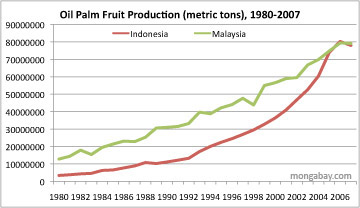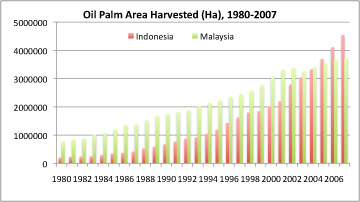For the first time, sales of certified sustainable palm oil have nearly met production, reports the Roundtable on Sustainable Palm Oil (RSPO), a group that has developed the leading environmental certification standard for palm oil.
In its February bulletin, the RSPO says that about 98 percent of the 120,000 metric tons of palm oil produced in January were purchased by processors and retailers.
The news suggests that demand for certified palm oil is finally picking up after a slow start. RSPO attributes a portion of the increase in demand to reduced transaction costs for purchasing certified oil to $2 per ton. Another dollar goes to fund the RSPO. Palm oil closed at $731 per ton today.
RSPO says the bulk of certified sustainable palm oil is currently transacted via certificates, which enable a company to pay for a certain quantity of certified palm oil but take delivery of physical palm oil from any source. It notes however that more “sustainably produced palm oil itself, kept ‘segregated’ throughout the supply chain, is becoming available for purchase.”
RSPO
  All data from FAOstat |
RSPO was formed as a response to concerns over the environmental impact of oil palm expansion. RSPO has created a set of criteria to make palm oil production less damaging to the environment. These include using natural pests and composting in place of synthetic pesticides and fertilizers whenever possible, implementing no burn policies, sparing high conservation value forests from development, taking measures to reduce air pollution, and creating catchment ponds to prevent palm oil mill effluent from entering waterways where it would damage aquatic habitats. The hope is that CPO can be sold at a premium to recoup the increased costs that certification entails.
Still not all environmental groups have bought into RSPO. Concerns over the certification standard have been stoked by pictures which activists claim show RSPO members continuing to clear high value conservation forest areas (HCV) in violation of certification protocol. Some critics have labeled RSPO a greenwashing initiative rather than a genuine effort to improve the environmental performance of palm oil. RSPO members have rejected these charges but concede that the certification process is still evolving.
Related articles
Consumers should help pay the bill for ‘greener’ palm oil

(01/12/2010) Palm oil is one of the world’s most traded and versatile agricultural commodities. It can be used as edible vegetable oil, industrial lubricant, raw material in cosmetic and skincare products and feedstock for biofuel production. Growing global demand for palm oil and the ensuing cropland expansion has been blamed for a wide range of environmental ills, including tropical deforestation, peatland degradation, biodiversity loss and CO2 emissions. In response to these concerns, a group of stakeholders—including activists, investors, producers and retailers—formed the Roundtable on Sustainable Palm Oil (RSPO) to develop a certification scheme for palm oil produced through environmentally- and socially-responsible ways. It is widely anticipated that the creation of a premium market for RSPO-certified sustainable palm oil (CSPO) would incentivize palm oil producers to improve their management practices.
Forest destruction by Sinar Mas undermines efforts to develop and promote greener palm oil
(12/14/2009) An investigation commissioned by Unilever, the world’s largest buyer of palm oil, confirms that Indonesian group Sinar Mas, the world’s second largest producer of palm oil, has been destroying forests and peatlands despite committing to “greener” palm oil production as a member of the Roundtable on Sustainable Palm Oil (RSPO). Unilever has now suspended its $32.6 million contract with Sinar Mas.
European companies not supporting ‘greener’ palm oil
(10/29/2009) Most European consumers of palm oil are failing to buy eco-certified palm oil, undermining efforts to encourage producers to reduce their impact on the environment, reports WWF.
Failure to support greener palm oil may lead industry to abandon environmental measures
(07/08/2009) Consumer apathy towards eco-certified palm oil have undermined efforts to improve the environmental performance of the industry, a top industry official told Reuters.
Consumers show no interest in eco-certified palm oil; WWF threatens naming and shaming campaign
(05/13/2009) Lack of interest in eco-certified palm oil among buyers threatens to undermine efforts to improve the environmental performance of the industry, reports the World Wildlife Fund (WWF).